- Home
- Roald Dahl
Skin and Other Stories Page 18
Skin and Other Stories Read online
Page 18
Well - I had done it. I stepped back and glanced at the little radio. Somehow, now, it looked different - no longer a silly box for making noises but an evil little creature that crouched on the table top with a part of its own body reaching out secretly into a forbidden place far away. I switched it on. It hummed faintly but made no other sound. I took my bedside clock, which had a loud tick, and carried it along to the yellow room and placed it on the floor by the sofa. When I returned, sure enough the radio creature was ticking away as loudly as if the clock were in the room - even louder.
I fetched back the clock. Then I tidied myself up in the bathroom, returned my tools to the workshop, and prepared to meet the guests. But first, to compose myself, and so that I would not have to appear in front of them with the blood, as it were, still wet on my hands, I spent five minutes in the library with my collection. I concentrated on a tray of the lovely Vanessa cardui - the 'painted lady' - and made a few notes for a paper I was preparing entitled 'The Relation between Colour Pattern and Framework of Wings', which I intended to read at the next meeting of our society in Canterbury. In this way I soon regained my normal grave, attentive manner.
When I entered the living-room, our two guests, whose names I could never remember, were seated on the sofa. My wife was mixing drinks.
'Oh, there you are, Arthur,' she said. 'Where have you been?'
I thought this was an unnecessary remark. 'I'm so sorry,' I said to the guests as we shook hands. 'I was busy and forgot the time.'
'We all know what you've been doing,' the girl said, smiling wisely. 'But we'll forgive him, won't we, dearest?'
'I think we should,' the husband answered.
I had a frightful, fantastic vision of my wife telling them, amidst roars of laughter, precisely what I had been doing upstairs. She couldn't - she couldn't have done that! I looked round at her and she too was smiling as she measured out the gin.
'I'm sorry we disturbed you,' the girl said.
I decided that if this was going to be a joke then I'd better join in quickly, so I forced myself to smile with her.
'You must let us see it,' the girl continued.
'See what?'
'Your collection. Your wife says that they are absolutely beautiful.'
I lowered myself slowly into a chair and relaxed. It was ridiculous to be so nervous and jumpy. 'Are you interested in butterflies?' I asked her.
'I'd love to see yours, Mr Beauchamp.'
The Martinis were distributed and we settled down to a couple of hours of talk and drink before dinner. It was from then on that I began to form the impression that our guests were a charming couple. My wife, coming from a titled family, is apt to be conscious of her class and breeding, and is often hasty in her judgement of strangers who are friendly towards her - particularly tall men. She is frequently right, but in this case I felt that she might be making a mistake. As a rule, I myself do not like tall men either; they are apt to be supercilious and omniscient. But Henry Snape - my wife had whispered his name - struck me as being an amiable simple young man with good manners whose main preoccupation, very properly, was Mrs Snape. He was handsome in a long-faced, horsy sort of way, with dark-brown eyes that seemed to be gentle and sympathetic. I envied him his fine mop of black hair, and caught myself wondering what lotion he used to keep it looking so healthy. He did tell us one or two jokes, but they were on a high level and no one could have objected.
'At school,' he said, 'they used to call me Scervix. Do you know why?'
'I haven't the least idea,' my wife answered.
'Because cervix is Latin for nape.'
This was rather deep and it took me a while to work out.
'What school was that, Mr Snape?' my wife asked.
'Eton,' he said, and my wife gave a quick little nod of approval. Now she will talk to him, I thought, so I turned my attention to the other one, Sally Snape. She was an attractive girl with a bosom. Had I met her fifteen years earlier I might well have got myself into some sort of trouble. As it was, I had a pleasant enough time telling her all about my beautiful butterflies. I was observing her closely as I talked, and after a while I began to get the impression that she was not, in fact, quite so merry and smiling a girl as I had been led to believe at first. She seemed to be coiled in herself, as though with a secret she was jealously guarding. The deep-blue eyes moved too quickly about the room, never settling or resting on one thing for more than a moment; and over all her face, though so faint that they might not even have been there, those small downward lines of sorrow.
'I'm so looking forward to our game of bridge,' I said, finally changing the subject.
'Us too,' she answered. 'You know we play almost every night, we love it so.'
'You are extremely expert, both of you. How did you get to be so good?'
'It's practice,' she said. 'That's all. Practice, practice, practice.'
'Have you played in any championships?'
'Not yet, but Henry wants very much for us to do that. It's hard work, you know, to reach that standard. Terribly hard work.' Was there not here, I wondered, a hint of resignation in her voice? Yes, that was probably it; he was pushing her too hard, making her take it too seriously, and the poor girl was tired of it all.
At eight o'clock, without changing, we moved in to dinner. The meal went well, with Henry Snape telling us some very droll stories. He also praised my Richebourg '34 in a most knowledgeable fashion, which pleased me greatly. By the time coffee came, I realized that I had grown to like these two youngsters immensely, and as a result I began to feel uncomfortable about this microphone business. It would have been all right if they had been horrid people, but to play this trick on two such charming young persons as these filled me with a strong sense of guilt. Don't misunderstand me. I was not getting cold feet. It didn't seem necessary to stop the operation. But I refused to relish the prospect openly as my wife seemed now to be doing, with covert smiles and winks and secret little noddings of the head.
Around nine-thirty, feeling comfortable and well fed, we returned to the large living-room to start our bridge. We were playing for a fair stake - ten shillings a hundred - so we decided not to split families, and I partnered my wife the whole time. We all four of us took the game seriously, which is the only way to take it, and we played silently, intently, hardly speaking at all except to bid. It was not the money we played for. Heaven knows, my wife had enough of that, and so apparently did the Snapes. But among experts it is almost traditional that they play for a reasonable stake.
That night the cards were evenly divided, but for once my wife played badly, so we got the worst of it. I could see that she wasn't concentrating fully, and as we came along towards midnight she began not even to care. She kept glancing up at me with those large grey eyes of hers, the eyebrows raised, the nostrils curiously open, a little gloating smile around the corner of her mouth.
Our opponents played a fine game. Their bidding was masterly, and all through the evening they made only one mistake. That was when the girl badly overestimated her partner's hand and bid six spades. I doubled and they went three down, vulnerable, which cost them eight hundred points. It was just a momentary lapse, but I remember that Sally Snape was very put out by it, even though her husband forgave her at once, kissing her hand across the table and telling her not to worry.
Around twelve-thirty my wife announced that she wanted to go to bed.
'Just one more rubber?' Henry Snape said.
'No, Mr Snape. I'm tired tonight. Arthur's tired, too. I can see it. Let's all go to bed.'
She herded us out of the room and we went upstairs, the four of us together. On the way up, there was the usual talk about breakfast and what they wanted and how they were to call the maid. 'I think you'll like your room,' my wife said. 'It has a view right across the valley, and the sun comes to you in the morning around ten o'clock.'
We were in the passage now, standing outside our own bedroom door, and I could see the wire I had put down that
afternoon and how it ran along the top of the skirting down to their room. Although it was nearly the same colour as the paint, it looked very conspicuous to me. 'Sleep well,' my wife said. 'Sleep well, Mrs Snape. Good night, Mr Snape.' I followed her into our room and shut the door.
'Quick!' she cried. 'Turn it on!' My wife was always like that, frightened that she was going to miss something. She had a reputation, when she went hunting - I never go myself - of always being right up with the hounds whatever the cost to herself or her horse for fear that she might miss a kill. I could see she had no intention of missing this one.
The little radio warmed up just in time to catch the noise of their door opening and closing again.
'There!' my wife said. 'They've gone in.' She was standing in the centre of the room in her blue dress, her hands clasped before her, her head craned forward, intently listening, and the whole of the big white face seemed somehow to have gathered itself together, tight like a wine-skin.
Almost at once the voice of Henry Snape came out of the radio, strong and clear. 'You're just a goddam little fool,' he was saying, and this voice was so different from the one I remembered, so harsh and unpleasant, it made me jump. 'The whole bloody evening wasted! Eight hundred points - that's eight pounds between us!'
'I got mixed up,' the girl answered. 'I won't do it again, I promise.'
'What's this?' my wife said. 'What's going on?' Her mouth was wide open now, the eyebrows stretched up high, and she came quickly over to the radio and leaned forward, ear to the speaker. I must say I felt rather excited myself.
'I promise, I promise I won't do it again,' the girl was saying.
'We're not taking any chances,' the man answered grimly. 'We're going to have another practice right now.'
'Oh no, please! I couldn't stand it!'
'Look,' the man said, 'all the way out here to take money off this rich bitch and you have to go and mess it up.'
My wife's turn to jump.
'The second time this week,' he went on.
'I promise I won't do it again.'
'Sit down. I'll sing them out and you answer.'
'No, Henry, please! Not all five hundred of them. It'll take three hours.'
'All right, then. We'll leave out the finger positions. I think you're sure of those. We'll just do the basic bids showing honour tricks.'
'Oh, Henry, must we? I'm so tired.'
'It's absolutely essential that you get them perfect,' he said. 'We have a game every day next week, you know that. And we've got to eat.'
'What is this?' my wife whispered. 'What on earth is it?'
'Shhh!' I said. 'Listen!'
'All right,' the man's voice was saying. 'Now we'll start from the beginning. Ready?'
'Oh Henry, please!' She sounded very near to tears.
'Come on, Sally. Pull yourself together.'
Then, in a quite different voice, the one we had been used to hearing in the living-room, Henry Snape said, 'One club.' I noticed that there was a curious lilting emphasis on the word 'one', the first part of the word drawn out long.
'Ace queen of clubs,' the girl replied wearily. 'King jack of spades. No hearts, and ace jack of diamonds.'
'And how many cards to each suit? Watch my finger positions carefully.'
'You said we could miss those.'
'Well - if you're quite sure you know them?'
'Yes, I know them.'
A pause, then 'A club.'
'King jack of clubs,' the girl recited. 'Ace of spades. Queen jack of hearts, and ace queen of diamonds.'
Another pause, then 'I'll say one club.'
'Ace king of clubs ...'
'My heavens alive!' I cried. 'It's a bidding code! They show every card in the hand!'
'Arthur, it couldn't be!'
'It's like those men who go into the audience and borrow something from you and there's a girl blindfold on the stage, and from the way he phrases the question she can tell him exactly what it is - even a railway ticket, and what station it's from.'
'It's impossible!'
'Not at all. But it's tremendous hard work to learn. Listen to them.'
'I'll go one heart,' the man's voice was saying.
'King queen ten of hearts. Ace jack of spades. No diamonds. Queen jack of clubs ...'
'And you see,' I said, 'he tells her the number of cards he has in each suit by the position of his fingers.'
'How?'
'I don't know. You heard him saying about it.'
'My God, Arthur! Are you sure that's what they're doing?'
'I'm afraid so.' I watched her as she walked quickly over to the side of the bed to fetch a cigarette. She lit it with her back to me and then swung round, blowing the smoke up at the ceiling in a thin stream. I knew we were going to have to do something about this, but I wasn't quite sure what because we couldn't possibly accuse them without revealing the source of our information. I waited for my wife's decision.
'Why, Arthur,' she said slowly, blowing out clouds of smoke. 'Why, this is a marvellous idea. D'you think we could learn to do it?'
'What!'
'Of course. Why not?'
'Here! No! Wait a minute, Pamela ...' but she came swiftly across the room, right up close to me where I was standing, and she dropped her head and looked down at me - the old look of a smile that wasn't a smile, at the corners of the mouth, and the curl of the nose, and the big full grey eyes staring at me with their bright black centres, and then they were grey, and all the rest was white flecked with hundreds of tiny red veins - and when she looked at me like this, hard and close, I swear to you it made me feel as though I were drowning.
'Yes,' she said. 'Why not?'
'But Pamela ... Good heavens ... No ... After all ...'
'Arthur, I do wish you wouldn't argue with me all the time. That's exactly what we'll do. Now, go fetch a deck of cards; we'll start right away.'
PUFFIN BOOKS
Published by the Penguin Group
Penguin Books Ltd, 80 Strand, London WC2R 0RL, England
Penguin Group (USA) Inc., 375 Hudson Street, New York, New York 10014, USA
Penguin Group (Canada), 90 Eglinton Avenue East, Suite 700, Toronto, Ontario, Canada M4P 2Y3 (a division of Pearson Penguin Canada Inc.)
Penguin Ireland, 25 St Stephen's Green, Dublin 2, Ireland (a division of Penguin Books Ltd)
Penguin Group (Australia), 250 Camberwell Road, Camberwell, Victoria 3124, Australia (a division of Pearson Australia Group Pty Ltd)
Penguin Books India Pvt Ltd, 11 Community Centre, Panchsheel Park, New Delhi - 110 017, India
Penguin Group (NZ), 67 Apollo Drive, Rosedale, Auckland 0632, New Zealand (a division of Pearson New Zealand Ltd)
Penguin Books (South Africa) (Pty) Ltd, Block D, Rosebank Office Park, 181 Jan Smuts Avenue, Parktown North, Gauteng 2193, South Africa
Penguin Books Ltd, Registered Offices: 80 Strand, London WC2R 0RL, England
puffinbooks.com
First published 2000
This edition published 2001
This collection copyright (c) Roald Dahl Nominee Ltd, 2000
Introduction copyright (c) Wendy Cooling, 2000
Title page illustration (c) Bill Gregory 2000
All rights reserved
The stories in this collection were first published in The Collected Short Stories of Roald Dahl by Michael Joseph Ltd 1991
The stories were originally published as follows:
'The Champion of the World' was first published in Great Britain in 1960 by Michael Joseph Ltd in Kiss Kiss copyright (c) Roald Dahl Nominee Ltd, 1953, 1954, 1958, 1959
'An African Story' and 'Beware of the Dog' were first published in Great Britain in 1946 by Hamish Hamilton Ltd in Over to You copyright (c) Roald Dahl Nominee Ltd, 1945
'Lamb to the Slaughter', 'My Lady Love, My Dove', 'Dip in the Pool', 'Galloping Foxley', 'Skin', 'The Wish' and 'The Sound Machine' were first published in Great Britain in 1954 by Seeker & Warburg Ltd in Someone Like You, revise
d, expanded and published by Michael Joseph Ltd in 1961 copyright (c) Roald Dahl Nominee Ltd, 1948, 1949, 1950, 1952, 1953, 1961
'The Surgeon' was first published in 1986 in Playboy copyright (c) Roald Dahl Nominee Ltd, 1986
ISBN: 978-0-14-192893-7
THERE'S MORE TO ROALD DAHL THAN GREAT STORIES ...
Did you know that 10% of Roald Dahl's royalties* from this book go to help the work of the Roald Dahl charities?
* * *
Roald Dahl's Marvellous Children's Charity exists to make life better for seriously ill children because it believes that every child has the right to a marvellous life.
This marvellous charity helps thousands of children each year living with serious conditions of the blood and the brain - causes important to Roald Dahl in his lifetime - whether by providing nurses, equipment or toys for today's children in the UK, or helping tomorrow's children everywhere through pioneering research.
Can you do something marvellous to help others? Find out how at www.marvellouschildrenscharity.org
* * *
* * *
The Roald Dahl Museum and Story Centre, based in Great Missenden just outside London, is in the Buckinghamshire village where Roald Dahl lived and wrote. At the heart of the Museum, created to inspire a love of reading and writing, is his unique archive of letters and manuscripts. As well as two fun-packed biographical galleries, the Museum boasts an interactive Story Centre. It is a place for the family, teachers and their pupils to explore the exciting world of creativity and literacy.
Find out more at www.roalddahlmuseum.org
* * *
Roald Dahl's Marvellous Children's Charity (RDMCC) is a registered charity no. 1137409.
The Roald Dahl Museum and Story Centre (RDMSC) is a registered charity no. 1085853.
The Roald Dahl Charitable Trust is a registered charity no. 1119330 and supports the work of RDMCC and RDMSC.
* Donated royalties are net of commission

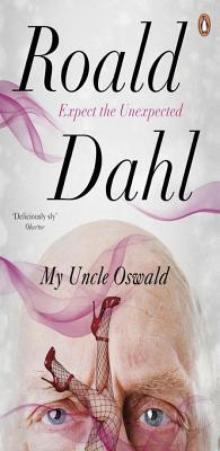 My Uncle Oswald
My Uncle Oswald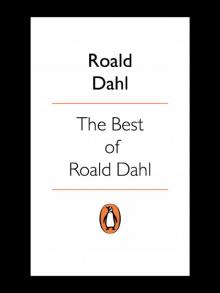 The Best of Roald Dahl
The Best of Roald Dahl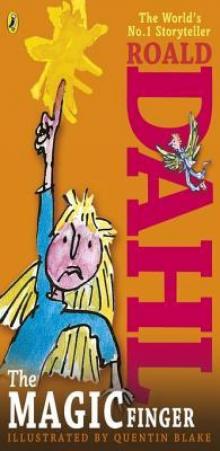 The Magic Finger
The Magic Finger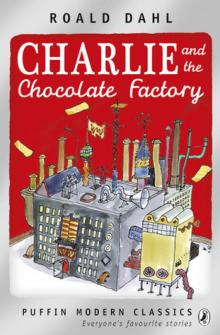 Charlie and the Chocolate Factory
Charlie and the Chocolate Factory Fantastic Mr Fox
Fantastic Mr Fox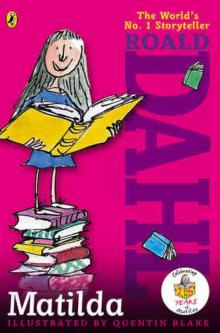 Matilda
Matilda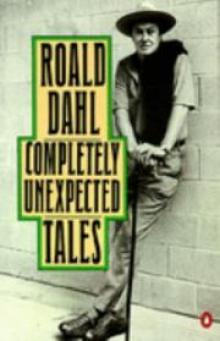 Completely Unexpected Tales: Tales of the Unexpected. More Tales of the Unexpected
Completely Unexpected Tales: Tales of the Unexpected. More Tales of the Unexpected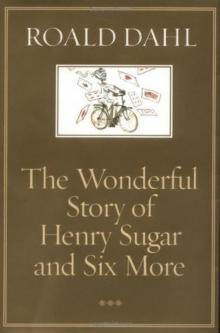 The Wonderful Story of Henry Sugar and Six More
The Wonderful Story of Henry Sugar and Six More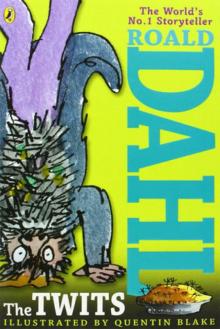 The Twits
The Twits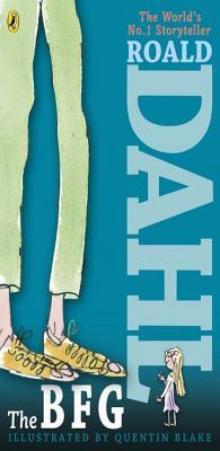 The BFG
The BFG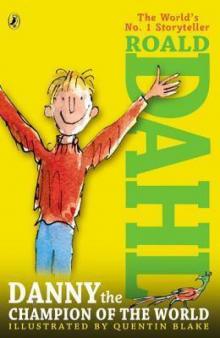 Danny the Champion of the World
Danny the Champion of the World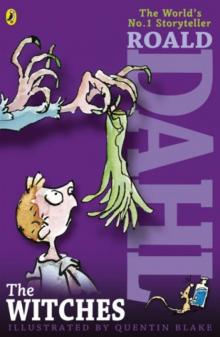 The Witches
The Witches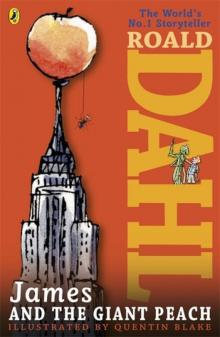 James and the Giant Peach
James and the Giant Peach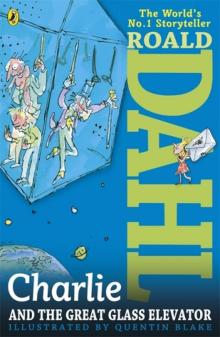 Charlie and the Great Glass Elevator
Charlie and the Great Glass Elevator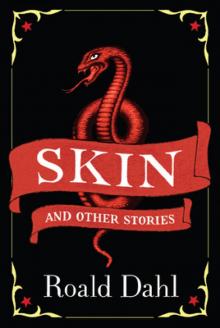 Skin and Other Stories
Skin and Other Stories Kiss Kiss
Kiss Kiss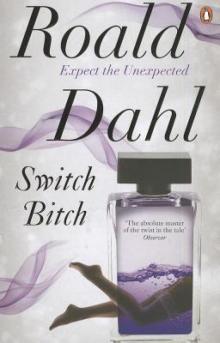 Switch Bitch
Switch Bitch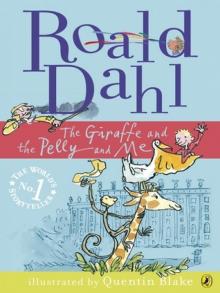 The Giraffe and the Pelly and Me
The Giraffe and the Pelly and Me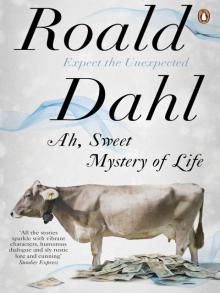 Ah, Sweet Mystery of Life
Ah, Sweet Mystery of Life Fear
Fear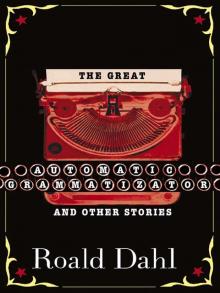 The Great Automatic Grammatizator and Other Stories
The Great Automatic Grammatizator and Other Stories Someone Like You
Someone Like You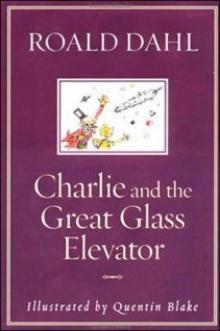 Charlie and the Great Glass Elevator c-2
Charlie and the Great Glass Elevator c-2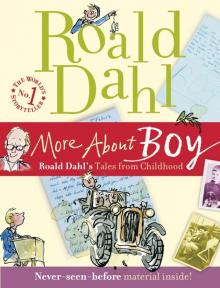 More About Boy
More About Boy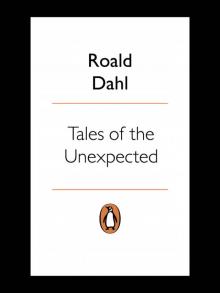 Tales of the Unexpected
Tales of the Unexpected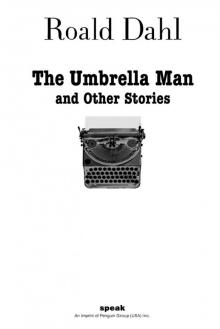 The Umbrella Man and Other Stories
The Umbrella Man and Other Stories Dirty Beasts
Dirty Beasts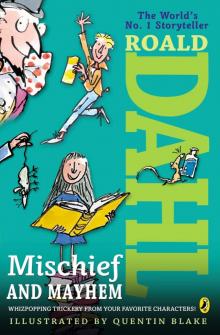 Roald Dahl's Mischief and Mayhem
Roald Dahl's Mischief and Mayhem The Collected Short Stories of Roald Dahl, Volume 1
The Collected Short Stories of Roald Dahl, Volume 1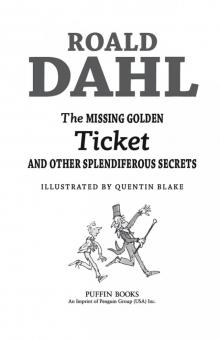 The Missing Golden Ticket and Other Splendiferous Secrets
The Missing Golden Ticket and Other Splendiferous Secrets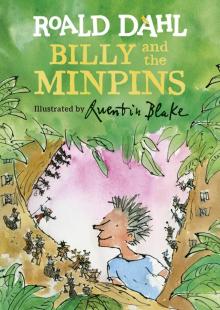 Billy and the Minpins
Billy and the Minpins Over to You
Over to You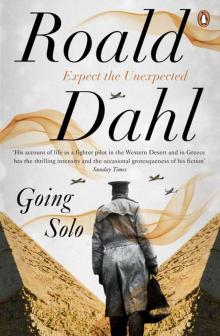 Going Solo
Going Solo Deception
Deception War
War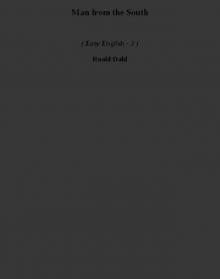 Man from the South ee-3
Man from the South ee-3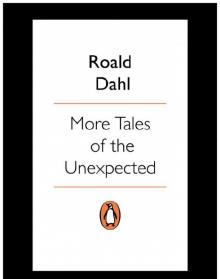 More Tales of the Unexpected
More Tales of the Unexpected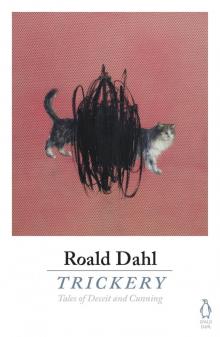 Trickery
Trickery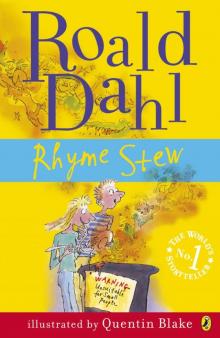 Rhyme Stew
Rhyme Stew Charlie and the Chocolate Factory (Puffin Modern Classics relaunch)
Charlie and the Chocolate Factory (Puffin Modern Classics relaunch)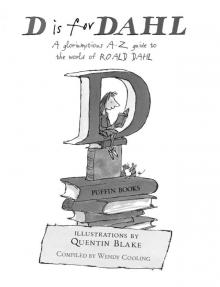 D is for Dahl
D is for Dahl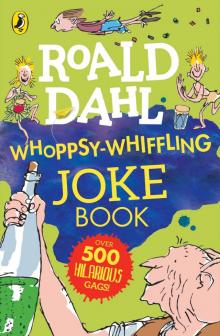 Roald Dahl Whoppsy-Whiffling Joke Book
Roald Dahl Whoppsy-Whiffling Joke Book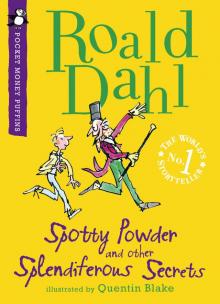 Spotty Powder and other Splendiferous Secrets
Spotty Powder and other Splendiferous Secrets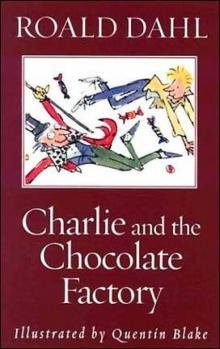 Charlie and the Chocolate Factory c-1
Charlie and the Chocolate Factory c-1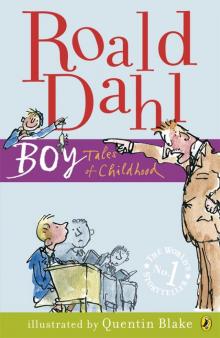 Boy
Boy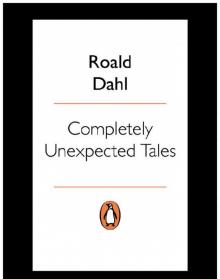 Completely Unexpected Tales
Completely Unexpected Tales Madness
Madness Innocence
Innocence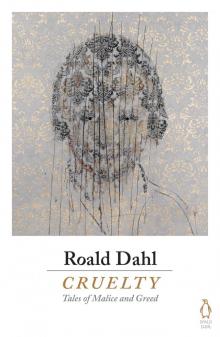 Cruelty
Cruelty George's Marvellous Medicine
George's Marvellous Medicine